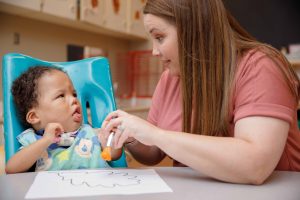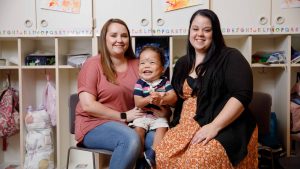UA’s RISE only branch with inclusive setting for children with chronic physical conditions

A smile. A laugh. A reach for a friend’s hand.
These emotional expressions are common for toddlers in child care settings, but they’re significant milestones for Jaden Walker, a 2-year-old student at the RISE Center at The University of Alabama.
Jaden has been enrolled at RISE since August. He spends roughly six hours a day at RISE, where his nurse, Tina Watkins, supports him with alternative modes of communication and accessing his environments due to his physical disabilities. Jones was born 11 weeks premature and has a rare genetic disorder called x-linked alpha thalassemia with intellectual disability, which has caused delays in his development.
“We’re working with Jaden being able to sit and stabilize himself, reaching and grabbing onto things, feeding himself and holding his own cup,” Watkins said. “He can be wherever his classmates are and be included in everything; even if we have to stop and address a medical need with him, we can pick right back up where we left off with the class.”
RISE Center in Tuscaloosa is the only program out of eight RISE Programs in the United States that is able to serve “medically fragile” children, a classification that can include a range of chronic physical conditions that require extensive nursing care not typically provided by preschools or day cares.
Walker received daily care from his mother, Jasmine Jones, his father, Brandon Walker, and a private duty nurse prior to enrolling at RISE. And before he came home in July 2018, Jaden spent 409 consecutive days in the hospital. Cumulatively, he was isolated from other children for more than two years, his mother said.
“I just want the same thing anyone wants for their kids – for him to reach his full potential,” Jones said. “RISE has given him the opportunity to do that and have a normal day, like any other kids. They’re not segregated or isolated to the home because of his disability.”
An ‘awesome program’

When Jaden first enrolled at RISE, Jones met with the staff to discuss elements of care specific to him: he’d been on a normal toddler diet with occasional supplements with a feeding tube, but he still uses a trach, the most significant basis for his nursing needs, Jones said. Additionally, he was weaned off a 24-hour ventilator, a learning curve for both Jones and the nurse.
Jones was anxious through the first couple of weeks, but comforted knowing the staff was “extremely cautious.”
“If they had questions about anything, they’d immediately call me,” she said. “It put me at ease.”
Now, Watkins, Jones and Jaden’s lead teacher communicate mostly at drop-off and pickup. Watkins said the three will talk on the phone or online about small victories during the day.
And while Jaden’s medical needs require balance with learning and socializing, Watkins said, the milestone moments they experience together “deepen our bond.”
“Socially, getting to see Jaden interact with his peers, smile with them and play, reach out and grab their hands, and even more beautifully, his friends reaching out to him and including him, it’s wonderful because these children are learning that we are all different, but that it is ok,” Watkins said. “Jaden getting to laugh and learning alongside his peers is what’s amazing.”
Jones said Jaden enjoys his time at RISE Center so much that he doesn’t want to leave when she picks him up each day.
“It took some getting used to for me being his mom and favorite person, and when I’d go to pick him up in the afternoon, sometimes he wouldn’t want to leave Tina’s arms,” Jones said. “Tina is wonderful.”
More work to be done
If RISE were not an option, Jones would continue in-home nursing, along with the care she provides.
But that would eliminate the vital social and learning components Jaden needs to help expand his communication skills. Further, private duty nurse availability is adversely affected by low pay and can be problematic for parents that work full time, Jones said.
In her career working with adults with disabilities, Jones has navigated similar obstacles for medical needs. Her work experiences prepared her “to an extent” for supports and resources for Jaden, but also for the lack thereof.
“Part of it is the pay – I’ve done some stakeholder meetings, kind of lobbying to increase what they pay so we can keep staff. But there’s still a need that’s not been met,” Jones said.
And though RISE is able to meet Jaden’s nursing needs, the lack of options outside of RISE are “still creating a segregated setting” for children.
“If a kid can’t come to school or day care because they need a nurse, then we’re not doing our best to be fully inclusive as a society,” Jones said. “So I’m really grateful for RISE.”
RISE Center is a part of the College of Human Environmental Sciences. Families with special needs children do not pay tuition at RISE.
